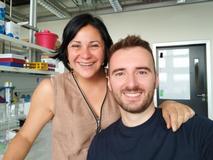CHF 10,000 for high-speed LiDAR sensing, more accessible microscopes, targetted enzyme therapies, a deep learning platform for physics-based simulations, and an AI-based HR platform.
23.07.2025
4D-Picosense, Eureka, NanoZymeX, Optineura AI, and Permitree were selected at Venture Kick's first financial and entrepreneurial support stage. Their projects develop high-speed, reliable LiDAR sensing for autonomous vision; make microscopes more accessible; deliver enzyme therapies precisely where they are needed; build a scalable deep learning platform for physics-based simulations; and help companies hire top global talent with the speed of AI.
 |
 4D-Picosense Co-Founders: Thanushan Kugathasan, Giuseppe Iacobucci, Lorenzo Paolozzi, Roberto Cardella, Leonardo Cecconi, and Viros Sriskaran
|
 Eureka: CEO Siyi Zhang & CTO Yu Liu
|
 NanoZymeX: Margarita C. Dinamarca & Boris Sevarika
|
 Optineura AI: CEO Alex Donzelli
|
 Permitree: Co-founders Hanna Runets & Simon Iyamu Perisanidis
|
4D-Picosense: High-speed, reliable LiDAR sensing for autonomous vision
LiDAR sensors are key enablers of accurate obstacle detection in autonomous vehicles, yet existing systems often underperform in real-world conditions such as bright sunlight, retroreflective glare, and fog. These limitations compromise both safety and scalability.
4D-Picosense addresses these challenges with a robust, low latency depth sensing technology developed at the University of Geneva by a team of physicists and microelectronics engineers: Giuseppe Iacobucci, Thanushan Kugathasan, Lorenzo Paolozzi, Roberto Cardella, Leonardo Cecconi, and Viros Sriskaran. The patented LiDAR sensor delivers a scalable and cost-effective solution that redefines industry performance benchmarks. It operates ten times faster than current systems and remains fully functional even under extreme lighting conditions. While focused on automotive LiDAR, it also meets critical needs in robotics, drones, and AR/VR applications where high speed and reliable three-dimensional sensing are essential.
Venture Kick funds will support market fit validation and business development, laying the foundation for customer acquisition and pilot deployment.
Eureka: Making microscopes more accessible
Today’s microscopes are either bulky and expensive tools or low-quality toys. For the general public, the microscopic world remains hidden and unknown. For students, the learning process can be complicated and uninspiring. For researchers, there is no scalable solution for environmental and biodiversity monitoring on a microscopic level.
Founded by Siyi Zhang (CEO), an ETH master’s student in environmental science, and Yu Liu (CTO), an ETH master’s student in Quantum Engineering, Eureka aims to revolutionize the user experience and reimagine the possibility of microscopes. With high-quality, affordable, portable, and digital microscopes, Eureka not only inspires curiosity and enables discovery for the general public, especially the young generation, but also provides a solution for large-scale, in-situ environmental and biodiversity monitoring. They have foreseen a huge market potential - an SOM of CHF 450 million for the recreation market, and CHF 400 million for education.
The Venture Kick funds will accelerate prototyping, contribute to patent application, and marketing campaign.
NanoZymeX: Delivering enzyme therapies precisely where they are needed
NanoZymeX is a health startup project developing a new therapy for rare genetic conditions known as lysosomal storage diseases. Their innovative approach uses lipid-based nanoparticles to deliver therapeutic enzymes directly into cells, helping the body break down harmful substances more effectively. Current treatments for lysosomal storage diseases often struggle to get the needed enzymes into the right parts of the body, especially inside cells where they’re needed most. As a result, patients face frequent, high-dose infusions with limited efficacy and high risk of immune responses.
The startup project is led by Boris Sevarika and Margarita C. Dinamarca, based at the University of Basel within the Nanopharmaceutical and Regulatory Science Group of Professor Scott McNeil. The team is developing a lipid nanoparticle-based enzyme delivery platform that encapsulates therapeutic enzymes and delivers them to the place in the body where they are needed. The first target is Pompe disease, a rare neuromuscular disorder with a global market exceeding USD 2 billion, but the platform is adaptable to a broad range of enzyme-driven indications in rare and metabolic diseases. This next-generation treatment aims to improve the lives of patients with these often-overlooked and difficult-to-treat disorders.
With Venture Kick support, the NanoZymeX team will refine its business model, conduct structured interviews with stakeholders to validate the solution, and expand its network of key opinion leaders in enzyme therapy and lysosomal storage disorders. These activities will position the project for incorporation and fundraising, laying a strong foundation for future growth.
Optineura AI: Building a scalable deep learning platform for physics-based simulations
Hardware product development relies heavily on time and compute-intensive physics-based simulations across design, testing, and manufacturing. This results in high engineering costs, delayed product launches, and limits teams from achieving optimal performance.
Optineura AI was founded by researchers and engineers from Caltech, ETH Zurich, and Google, together with former executives from leading physics simulation software companies. The team is building a versatile deep learning platform that adapts across engineering use cases with minimal effort, while inherently respecting the physics of each problem. Their solution addresses a global market of over 9 million hardware engineers in need of faster and smarter simulation tools.
The Venture Kick funds will support Optineura AI in scaling its platform to cover a broader range of engineering use cases, accelerating progress toward widespread industry adoption.
Permitree: Helping companies hire top global talent with the speed of AI
Switzerland faces a massive skill shortage, with 1.2M workers estimated to be missing by 2035. But hiring highly qualified talent from outside the EU remains painfully bureaucratic. Permitree is fixing that. Their AI platform simplifies work permit applications by pairing AI with immigration experts.
Permitree was founded by Hanna Runets, who previously worked at a YC-backed immigration startup, and Simon Perisanidis, an NLP expert from ETH, who already built a startup in the HR space before. Backed by experts in immigration and AI, the team has already run paid pilots with Swiss law firms and helped ETH startups hire global talent. Their target: the CHF 15B Global immigration market.
With Venture Kick funding, Permitree will incorporate in Switzerland, hire an engineer, and finalize its MVP to automate the first 10 law firms’ workflows, making hiring faster and more inclusive.
LiDAR sensors are key enablers of accurate obstacle detection in autonomous vehicles, yet existing systems often underperform in real-world conditions such as bright sunlight, retroreflective glare, and fog. These limitations compromise both safety and scalability.
4D-Picosense addresses these challenges with a robust, low latency depth sensing technology developed at the University of Geneva by a team of physicists and microelectronics engineers: Giuseppe Iacobucci, Thanushan Kugathasan, Lorenzo Paolozzi, Roberto Cardella, Leonardo Cecconi, and Viros Sriskaran. The patented LiDAR sensor delivers a scalable and cost-effective solution that redefines industry performance benchmarks. It operates ten times faster than current systems and remains fully functional even under extreme lighting conditions. While focused on automotive LiDAR, it also meets critical needs in robotics, drones, and AR/VR applications where high speed and reliable three-dimensional sensing are essential.
Venture Kick funds will support market fit validation and business development, laying the foundation for customer acquisition and pilot deployment.
Eureka: Making microscopes more accessible
Today’s microscopes are either bulky and expensive tools or low-quality toys. For the general public, the microscopic world remains hidden and unknown. For students, the learning process can be complicated and uninspiring. For researchers, there is no scalable solution for environmental and biodiversity monitoring on a microscopic level.
Founded by Siyi Zhang (CEO), an ETH master’s student in environmental science, and Yu Liu (CTO), an ETH master’s student in Quantum Engineering, Eureka aims to revolutionize the user experience and reimagine the possibility of microscopes. With high-quality, affordable, portable, and digital microscopes, Eureka not only inspires curiosity and enables discovery for the general public, especially the young generation, but also provides a solution for large-scale, in-situ environmental and biodiversity monitoring. They have foreseen a huge market potential - an SOM of CHF 450 million for the recreation market, and CHF 400 million for education.
The Venture Kick funds will accelerate prototyping, contribute to patent application, and marketing campaign.
NanoZymeX: Delivering enzyme therapies precisely where they are needed
NanoZymeX is a health startup project developing a new therapy for rare genetic conditions known as lysosomal storage diseases. Their innovative approach uses lipid-based nanoparticles to deliver therapeutic enzymes directly into cells, helping the body break down harmful substances more effectively. Current treatments for lysosomal storage diseases often struggle to get the needed enzymes into the right parts of the body, especially inside cells where they’re needed most. As a result, patients face frequent, high-dose infusions with limited efficacy and high risk of immune responses.
The startup project is led by Boris Sevarika and Margarita C. Dinamarca, based at the University of Basel within the Nanopharmaceutical and Regulatory Science Group of Professor Scott McNeil. The team is developing a lipid nanoparticle-based enzyme delivery platform that encapsulates therapeutic enzymes and delivers them to the place in the body where they are needed. The first target is Pompe disease, a rare neuromuscular disorder with a global market exceeding USD 2 billion, but the platform is adaptable to a broad range of enzyme-driven indications in rare and metabolic diseases. This next-generation treatment aims to improve the lives of patients with these often-overlooked and difficult-to-treat disorders.
With Venture Kick support, the NanoZymeX team will refine its business model, conduct structured interviews with stakeholders to validate the solution, and expand its network of key opinion leaders in enzyme therapy and lysosomal storage disorders. These activities will position the project for incorporation and fundraising, laying a strong foundation for future growth.
Optineura AI: Building a scalable deep learning platform for physics-based simulations
Hardware product development relies heavily on time and compute-intensive physics-based simulations across design, testing, and manufacturing. This results in high engineering costs, delayed product launches, and limits teams from achieving optimal performance.
Optineura AI was founded by researchers and engineers from Caltech, ETH Zurich, and Google, together with former executives from leading physics simulation software companies. The team is building a versatile deep learning platform that adapts across engineering use cases with minimal effort, while inherently respecting the physics of each problem. Their solution addresses a global market of over 9 million hardware engineers in need of faster and smarter simulation tools.
The Venture Kick funds will support Optineura AI in scaling its platform to cover a broader range of engineering use cases, accelerating progress toward widespread industry adoption.
Permitree: Helping companies hire top global talent with the speed of AI
Switzerland faces a massive skill shortage, with 1.2M workers estimated to be missing by 2035. But hiring highly qualified talent from outside the EU remains painfully bureaucratic. Permitree is fixing that. Their AI platform simplifies work permit applications by pairing AI with immigration experts.
Permitree was founded by Hanna Runets, who previously worked at a YC-backed immigration startup, and Simon Perisanidis, an NLP expert from ETH, who already built a startup in the HR space before. Backed by experts in immigration and AI, the team has already run paid pilots with Swiss law firms and helped ETH startups hire global talent. Their target: the CHF 15B Global immigration market.
With Venture Kick funding, Permitree will incorporate in Switzerland, hire an engineer, and finalize its MVP to automate the first 10 law firms’ workflows, making hiring faster and more inclusive.


